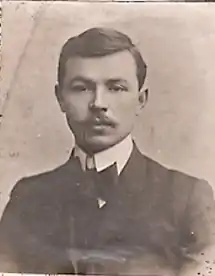Nicholas Kalashnikoff
Nicholas Kalashnikoff (May 17, 1888 – August 17, 1961) was a Siberian-American author who wrote in the 1930s to 1950s. Before moving to the United States in 1924, Kalashnikoff participated in the 1905 Russian Revolution and was a political exile during the rest of the 1900s. With the military, Kalashnikoff served as a captain during World War I and a general in the Russian Civil War. After arriving in the United States, Kalashnikoff published his 1939 autobiography They That Take the Sword and received two fellowships from MacDowell by 1941.

Following his expansion into children's books in 1944, Kalashnikoff was an author until the early 1950s. He used his past to create Jumper: The Life of a Siberian Horse and My Friend Yakub. In fictional works, Kalashnikoff wrote about a mythical legend from the Yakut with Toyon: A Dog of the North and His People. His book about a fictional Lamut shepherd, The Defenders, received a Newbery Honor in 1952.
Early life and education
On May 17, 1888, Kalashnikoff was born in Minusinsk, Siberia.[1] During the 1900s, Kalashnikoff studied philosophy and history at Moscow University before joining the 1905 Russian Revolution.[2]
Career
After living in Siberia as a political exile from 1905 to 1909, Kalashnikoff was an Army captain for Russia during World War I and a Siberian general throughout the Russian Civil War.[3] During the 1920s, Kalashnikoff lived in China due to war before moving to the United States in 1924.[2] In 1939, Kalashnikoff became a writer with his autobiography They That Take the Sword.[4] By 1941, Kalashnikoff had received two fellowships from MacDowell.[5]
In 1944, Kalashnikoff wrote a children's book titled Jumper: The Life of a Siberian Horse. Kalashnikoff's book was about a warhorse that he had previously owned.[6] With Toyon: A Dog of the North and His People, Kalashnikoff retold a mythical legend from the Yakuts in his 1950 book.[7] In The Defender, Kalashnikoff wrote about a Lamut shepherd for his book in 1952.[8] That year, The Defender was named a Newbery Honor.[9] Kalashnikoff used his childhood as a basis for the 1953 book My Friend Yakub.[10]
Personal life
On August 17, 1961, Kalashnikoff died in New York from cardiovascular disease.[11] He was married and had no children.[3]
- * Кан Г. С. Грозя бедой преступной силе… Летучий боевой отряд Северной области (1906-1908). Т.I-II» (СПб., 2021) ISBN 978-5-87991-153-4
References
- Commire, Anne (1979). "Kalashnikoff, Nicholas 1888-1961". Something about the Author. Vol. 16. Detroit: Gale Research. p. 173. ISBN 0810300974.
- Fuller, Muriel, ed. (1977). "Nicholas Kalashnikoff". More Junior Authors. New York: The H.W. Wilson Company. p. 119. ISBN 0824200365.
- Locher, Frances Carol, ed. (1978). "Kalashnikoff, Nicholas 1888-1961". Contemporary Authors. Vol. 73–76. Detroit: Gale Research Company. p. 325. ISBN 0810300311.
- "20 Eventful Years in Russia, A Social, Human Document". The Democrat and Chronicle Magazine. September 17, 1939. p. 14.
- "Nicholas Kalashnikoff". MacDowell. Retrieved January 5, 2023.
- T.F.M. (November 26, 1944). "Real, Live Horse". The Hartford Courant Magazine. p. Fourteen.
- Medlock, H. (October 22, 1950). "Story Of Dog, For All Ages". Dayton Daily News. sec. Second p. 9.
- G. A. N. (June 20, 1952). "Book Review". The Gazette and Daily. York, Pennsylvania. p. 37.
- "Newbery Medal and Honor Books, 1922-Present". American Library Association. 30 November 1999. Retrieved 6 April 2020.
- K. G. (December 13, 1953). "Books for Children". The News and Observer. p. IV-5.
- "Russian-Born Novelist Dies". Red Bank Register. August 18, 1961. p. 2.